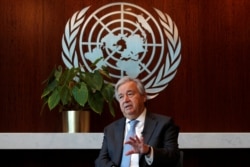The United Nations marked its 75th anniversary Monday amid a global pandemic and other serious challenges that the secretary-general said highlight the urgency for stronger international cooperation.
“The COVID-19 pandemic has laid bare the world’s fragilities. We can only address them together,” Secretary-General Antonio Guterres said, referencing the disease caused by the coronavirus. “Today, we have a surplus of multilateral challenges and a deficit of multilateral solutions.”
Confirmed coronavirus cases worldwide have surpassed 31 million with more than 960,000 deaths, according to the Johns Hopkins University, which tracks the data.
The anniversary commemoration kicks off the U.N.’s annual meeting of world leaders. However, the pandemic has transformed the session into a mostly virtual gathering. Throughout the week, a single, masked envoy representing each nation will be present in the cavernous General Assembly Hall in order to maintain social distancing. Heads of state and prime ministers will join the meetings from their home countries via video message.
The U.N. was born in 1945 in the aftermath of World War II to prevent another large-scale conflict.
“A Third World War — which so many had feared — has been avoided,” Guterres said. “Never in modern history have we gone so many years without a military confrontation between the major powers. This is a great achievement of which member states can be proud — and which we must all strive to preserve.”
He noted other U.N. accomplishments, including reducing hunger and poverty, assisting millions of victims of conflict and disaster, and the eradication of diseases. But the list of work ahead is daunting.
“Twenty-five years since the Beijing Platform for Action, gender inequality remains the greatest single challenge to human rights around the world,” Guterres said. “Climate calamity looms. Biodiversity is collapsing. Poverty is again rising. Hatred is spreading. Geopolitical tensions are escalating. Nuclear weapons remain on hair-trigger alert. Transformative technologies have opened up new opportunities but also exposed new threats.”
The United States is the host country of the United Nations, which is headquartered in New York City. The U.S. is also the largest single funder of the organization’s work.
“It is hard to grasp the remarkable evolution of the United Nations over the last 75 years,” said U.S. Deputy U.N. Ambassador Cherith Norman Chalet. “From cautious, early steps among a few global leaders to today’s vast networks of organizations, agencies, and functions, the U.N. has grown well beyond the vision of its founders.”
The administration of U.S. President Donald Trump has been critical of the U.N., withdrawing funding and cooperation from several of its agencies, including the World Health Organization and the Human Rights Council.
Chalet said the organization has for too long been resistant to real reform and lacks transparency.
“The 75th anniversary of the U.N. is the right time to ask questions about the institution’s strengths and weaknesses, review and learn from its failures, and celebrate its accomplishments,” she said.
The U.N. is using its anniversary year as a moment for reflection. More than 1 million people in 80 countries have provided feedback to a global survey about the organization and its work.
Nearly 90% said global cooperation is crucial to deal with today’s challenges, and that the pandemic has made international cooperation more urgent. Nearly three-quarters said the U.N. is “essential” for tackling global challenges, but they also want the organization to change and innovate.
The General Assembly adopted a declaration for the anniversary, which in part, says, “There is no other global organization with the legitimacy, convening power and normative impact of the United Nations. No other global organization gives hope to so many people.”








